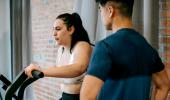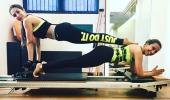If you reduce 1 kg of weight, the weight on your knees will be reduced by four times, says senior physiotherapist Dr Shakeeb Ahmed Khan.

Knee problems are not uncommon to Indians.
In fact, one of the main health issues among young adults and senior citizens is osteoarthritis of the knee joints.
A sedentary lifestyle coupled with limited mobility is the leading cause of weak knees, particularly in young adults and working professionals.
What causes knee pain?
People complain of knee pain due to old age, wear and tear, poor muscle strength and conditioning.
Less protein intake, incorrect posture and ergonomics also contribute to knee pain.
In India, sometimes sitting cross-legged on the floor for too long also affects the knee joints.
The rise in obesity combined by a general lack of physical exercise puts additional weight on the knee joints.
Rheumatoid arthritis, bursitis (painful swelling of the fluid-filled sac that cushions the joints), ligament and meniscal injury (damage to the C-shaped cartilage in the knee) and chondromalacia patella (softening and break down of the cartilage under the kneecap or patella) are other reasons why you could experience pain in the knee joints.
Over the last couple of years, we have also been noticing an increasing trend of ligament injury and meniscal tear due to road traffic accidents, particularly involving two-wheelers.
Similarly, individuals who play badminton and football may experience ACL tear and meniscal tear that affects the knee.
What are the warning signs that your knees are weak?
The primary function of knee joint is movement. It helps carry out our day-to-day activities like sitting, sitting to standing, walking and climbing stairs.
Early warning signs include pain while performing these daily activities. It would typically start with one joint and progress to other joints.
In extreme cases, apart from excruciating pain, people also complain of weakness, loss of balance and co-ordination.
One of the immediate things you can do is to visit an orthopaedic consultant or a physiotherapist to assess your knee.
Once you are diagnosed with knee pain, it is important to carry out all daily activities with less intensity and simultaneously build strength around the knee joints.
What changes can you make in your diet and lifestyle for healthy knees?
Diet is a very important aspect for stronger knees.
You have strong knees when your muscles like quadriceps, hamstrings, abductors and adductors of hip and gluteal muscles are regularly strengthened.
For this, sufficient protein intake is necessary.
To ensure muscles are not quickly fatigued, you may consult a nutritionist and dietician based on your food preferences to get your required protein intake through food.
For healthy knees, movement, particularly the full range of motion, is important.
Our knees typically perform only two movements -- flexion (bending the knee) and extension (straightening the knee joint).
For a healthy and active lifestyle, you must walk, jog, cycle and climb stairs daily. You may also add weight through weight cuffs or use a resistance band.
If you have weak knees, avoid standing for long hours while working.
If your job involves standing for a long period, take short breaks. Shift your weight from one knee to the other and avoid sitting cross-legged on the floor.
If you are doing high intensity exercise or playing a sport, please wear a knee cap or crepe bandage.
Weight management is crucial for the health of your knees as it bears the weight of your entire body.
If you reduce 1 kg of weight, the weight on your knees will be reduced by four times.
Simple exercises for people with knee pain
You can always start with brisk walking and jogging.
Knee strengthening involves exercises like squats, lunges and knee curls.
VMO (Vastus Medialis Oblique, which is a part of your quadriceps muscle) also requires strengthening. For this, an expert will place a cushion under the knee, guide you to press down, raise the leg straight, hold for 10 seconds and repeat.
Static quadriceps exercises, which involves tightening and relaxing the muscle, are also helpful, especially for the elderly.
These exercises have to be done consistently for better results.
Young adults can opt for intense training using the TheraBand (resistance band), weight cuffs, quadricep chair and other gym equipment.
People with disabilities can also perform these exercises under the supervision of an expert so that they are careful with the balance.
Individuals who use wheelchair can use weight cuffs, the TheraBand or practise seated marching where knees are carefully lifted in sitting position.
Always remember: Motion is a lotion. For healthier knees, correct posture and movement is the key.
Who should get a knee replacement?
For individuals experiencing severe pain and issues with basic mobility due to knee damage, experts may suggest knee replacement surgery.
Knee replacement is a good solution provided you receive rehabilitation in the form of physiotherapy post surgery.
However knee replacement must never be the first choice for knee pain or osteoarthritis. It must only be considered if physiotherapy has not been helpful after a long duration.
It is usually recommended only for people with severe osteoarthritis and mobility loss who are unable to walk for 10 to 15 minutes, and for people with gradual progressing deformities.
Total knee replacement surgeries are expensive and often far beyond reach for many Indian families.
It is important to consider all possible aspects of the patient before opting for any surgical procedure for knees or joints.
Dr Shakeeb Ahmed Khan is a senior consultant physiotherapist with over 13 years of experience specialising in orthopaedic and paediatric physiotherapy.
- You can post your health-related questions to Dr Shakeeb Ahmed Khan HERE.
Disclaimer: All content and media herein is written and published online for informational purposes only. It is not a substitute for professional medical advice. It should not be relied on as your only source for advice.
Please always seek the guidance of your doctor or a qualified health professional with any questions you may have regarding your health or a medical condition. Do not ever disregard the advice of a medical professional, or delay in seeking it because of something you have read herein.
If you believe you may have a medical or mental health emergency, please call your doctor, go to the nearest hospital, or call emergency services or emergency helplines immediately. If you choose to rely on any information provided herein, you do so solely at your own risk.
Opinions expressed herein cannot necessarily provide advice to fit the exact specifics of the issues of the person requesting advice.











